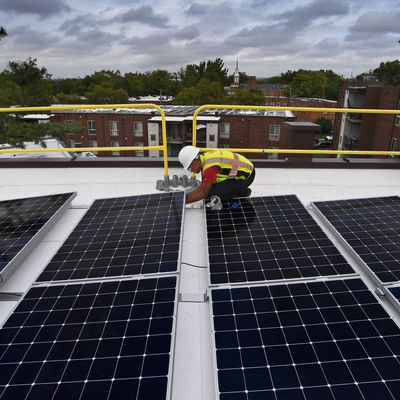
A college diploma is the new high-school degree. In a 21st-century economy, a higher education is the only reliable ticket to the middle class. We can’t solve inequality without solving the crisis of college affordability.
For decades now, liberals have taken these truths to be self-evident. After Ronald Reagan tore up the New Deal order, centrist Democrats found education a convenient panacea for middle-class decline: If differential access to quality schools and advanced skills were the leading drivers of America’s exploding inequality, then the problem could be redressed without massively redistributing wealth and income from the existing economic elite. Rather, restoring shared prosperity required little more than improving the quality of instruction in America’s K-12 schools, expanding access to credit for college expenses, and encouraging the nation’s undergraduates to master the STEM skills that our “knowledge economy” so desperately craved. As for those who lacked the innate abilities necessary for making the grade in our burgeoning meritocracy: Let them eat Earned Income Tax Credits.
The party’s left flank never stopped agitating for social democracy. But in making the case for tuition-free college, even figures like Bernie Sanders tacitly endorse the premise that, in the modern era, quality employment naturally requires higher levels of education than it did in the past. One of the first sentences on the web page detailing his higher-education agenda reads “Good jobs require a good education.”
Improving our nation’s public schools is a noble cause. And establishing higher education as a right available to all Americans who desire it, regardless of their class position or background, is too. But the fact that a college diploma has become a prerequisite for economic security is not some apolitical product of economic progress. And the idea that noncollege-educated Americans lack the skills that our modern economy requires is a pernicious lie.
To see why this is the case, take a glance at the newly released Employment Projections report from the Bureau of Labor Statistics (BLS). According to the BLS’s estimates, the five fastest-growing occupations in the United States over the next ten years will be solar panel installers, wind turbine technicians, home health aides, personal care aides, and occupational therapy assistants. Not a single one of those jobs requires a four-year college diploma. Only occupational therapy assistants need an associate’s degree. Meanwhile, the occupations poised to add the most jobs to the economy — home and personal care aides — require a high-school diploma or less. Unfortunately, at present, Americans who perform these vitally necessary forms of work earn an average of $24,000 a year.
There is simply no way of rebuilding shared prosperity in the U.S. without increasing the value our society assigns to the people who care for its elderly and infirm, or deliver its packages, or serve its food. Our society cannot function without such workers, and their efforts are no less objectively valuable than those of the unionized manufacturing workers who comprised the middle class of yesteryear. Perhaps Bernie Sanders is right that, in America today, “a college degree is the new high school diploma.” But it shouldn’t be. The demand for high-school-educated workers is large and growing. We don’t need everyone to gain the same skill set that our highly educated political class has attained; we just need to pay blue- and pink-collar workers what their efforts are actually worth.
Fortunately, a Democratic party that was earnestly committed to reviving the middle class would have little trouble doing so. The decline of manufacturing and rise of service-sector employment has pushed down wages for the American working class. But they didn’t have to. If our government made it easier for home health-care aides, food service workers, and retail employees to organize, and demand higher wages and benefits from their employers (or else, from the state), then labor could win back its postwar-era share of economic growth. The beauty of our contemporary, service-centric economy is that its working-class jobs can’t be outsourced. Most Americans cannot relocate their grandparents to India to secure more easily exploitable care workers. Fast-food restaurants can’t temper their staffs’ wage demands by threatening to relocate unless they’re willing to sacrifice market share. As the cost of service labor rises, some firms will seek to replace their workers with automation. But that is just another way of saying that increasing service workers’ leverage over their employers will increase productivity, innovation, and the prosperity of our society. So long as we use the gains of automation to finance robust social benefits and job-retraining programs, we should greet our robot replacements as liberators.
America’s working-class doesn’t lack the skills or knowledge to make vital contributions to our society. Our political class, however, does still has some learning to do.































